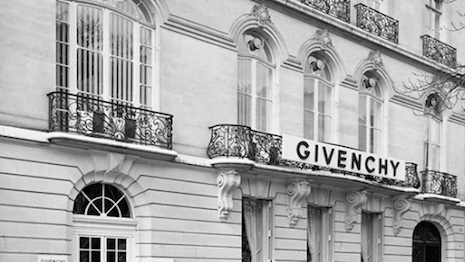 Yang Mi has severed her relationship with Versace. Image credit: Versace
Yang Mi has severed her relationship with Versace. Image credit: Versace
Luxury brands must approach the Chinese market with political and cultural sensitivity as recent missteps by fashion labels have drawn consumer criticism.
As tensions heighten between Hong Kong and China, European luxury labels have been accused of not respecting China’s territorial claims in a number of ways. These situations could prove financially damaging, as Chinese consumers represent about a third of the luxury market, and growing.
Chinese criticisms
Last week, fashion labels Versace and Givenchy apologized after their T-shirt designs received backlash in China.
Both brands were selling shirts that listed areas of China including Hong Kong and Macau as separate countries, which Chinese consumers felt was disrespectful of the nation’s sovereignty.
Givenchy was one of the brands that drew ire from the Chinese government. Image credit: Givenchy
Officially, the Chinese government views Hong Kong and Macau as special administrative regions with high levels of autonomy. Both are former European colonies that were transferred to Chinese rule in the late 1990s.
However, China views Taiwan, which has a democratically-elected government, as a rebellious province that should be reunified. Meanwhile, Tibet is a province-level entity of China.
Brands’ failure to acknowledge these intricacies has led to criticism from both the Chinese government and Chinese consumers.
In light of the recent controversy, Versace and Givenchy both issued statements on social media and recalled the products in question. Despite the apology, Yang Mi, a Chinese actress who recently began working with Versace, backed out of her spokesmodel role with the brand (see story).
According to WWD, The People’s Daily, the Communist Party of China’s newspaper, published an editorial attacking the brands.
“To do business in China, you have to abide the Chinese laws,” the paper said. “This is a matter of principle. To these unruly multinational corporations, in addition to condemning, we should also take some self-defense tools from the ‘toolbox.’
“All enterprises that damage China’s sovereignty should be alerted,” it continued.
Other luxury brands have drawn negative attention for listing Hong Kong and Taiwan as separate from China on their Web sites.
Crystal maker Swarovski apologized on social media after consumers discovered it described Hong Kong as a country on its Web site.
Swarovski was one of several luxury brands that apologized to Chinese consumers on social media
Chinese K-pop star Lay Zhang released a statement on Chinese social media platform Weibo after it was discovered U.S. fashion label Calvin Klein lists Taiwan as its own entity on its English-language Web site.
“Zhang deeply loves his country and supports the ‘One China’ policy,” the statement said, according to Footwear News. “He is against any acts or words that split his country. All brands that collaborate with him should be careful about the issue.”
Calvin Klein has since apologized. Mr. Lay, however, terminated his contract with South Korea’s Samsung for also implying Hong Kong and Taiwan are distinct from China on its Web site.
Bloomberg also reported that Chinese technology Huawei implies that Taiwan is separate from China on select smartphones based on users’ locations.
Last year, China’s communist government removed Marriott’s local Web site for a week after the hotel group listed Hong Kong and Tibet as countries.
Luxury impact
Backlash against brands has increased at time when anti-government protests in Hong Kong have become increasingly hostile.
Protests against a planned extradition law with mainland China began in Hong Kong in June, with activists accusing China of restricting the city’s autonomy. Initially peaceful, demonstrations have resulted in city police firing tear gas and rubber bullets at crowds on multiple occasions.
Although the original piece of legislation that triggered the protests was suspended, rallies and confrontations have continued into August (see story).
This political unrest in Hong Kong is already impacting the luxury business at large.
The Savigny Luxury Index, which tracks 17 of the biggest luxury companies by market capitalization, finished July down 0.3 percent despite a slight bump in the middle of the month. Strong demand in mainland China helped propel sales growth, in spite of continued trade tensions with the United States, but investors remain concerned about prolonged protests in Hong Kong (see story).
Luxury relies on Chinese consumers.
In 2018 the overall luxury business grew 5 percent to $1.4 trillion, primarily propelled by rising demand from affluents in mainland China.
Luxury sales in mainland China alone grew 18 percent in 2018, according to the 17th edition of Bain & Company's Luxury Study, produced in partnership with Altagamma. Currently, Chinese consumers are about a third of the luxury market, but Bain expects this to grow to 45 percent by 2025 (see story).
Millennial Chinese especially are driving luxury ecommerce sales, making the Web site controversies more meaningful.

